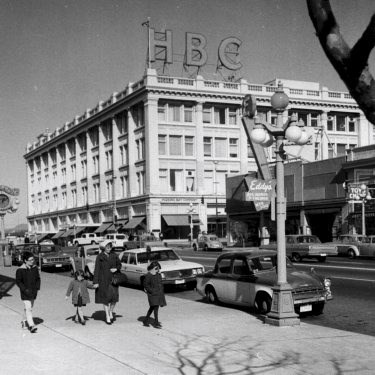The historic Bay Building -- once a showcase department store built from fur trading proceeds -- is on its way to being revived as a condominium building.
And trading will once again figure prominently in its destiny, although this time, Victoria air space is the commodity being traded.
Victoria city council unanimously approved rezoning that will lead to the restoration of the landmark four-storey Georgian Revival building late last night at a public hearing at which residents lined up behind the microphone to speak -- almost all favourably -- about the project.
Two of the towers -- at 24 and 18-storeys -- are well over the normally allowed 14-storey height for buildings in the downtown area. The third is 14 storeys.
In that sense, developer Rick Ilich and the city were trading air: Ilich agreed to keep the Bay building at its current height, which is below the limits on density the city has set for the area, while exceeding the density limits on two of the towers. (Density limits dictate how much building is on the property).
Buoyed by the unexpected vote of approval for his project, Ilich enthused that it will be "the most significant heritage restoration in Western Canada."
The $250-million proposal has been widely watched by neighbourhood associations and the development community who see it as the litmus test for where the city, which has a reputation for resisting tall buildings, could go in terms of height.
But height barely caused a ripple last night among councillors, or the people who packed the council chambers to hear about the project -- prompting Coun. Bea Holland to note how rare it was to have such strong support for a development.
Coun. Chris Coleman commented about the detailed work Townline did on the project, calling it a "once in a lifetime" opportunity for the city.
Mayor Alan Lowe said the unusual circumstances of the Bay revitalization were unlikely to repeat themselves, "so I doubt this will set the precedent people are worried about" -- referring to the fear the city will approve higher buildings in future.
Members of the public also praised the project as a way to save a beloved building and liven up a decaying part of town.
John Paul Robinson remarked that the "city needs reviving."
Another speaker said it would get "downtown off life support."
A North Park resident said greater density downtown would ease growth pressures on adjacent neighbourhoods such as James Bay, Fairfield and North Park.
But some speakers, like Darryl Woods, worried that Victoria is becoming another 91原创 in terms of density.
During the development process, disapproving murmurs have swirled around some aspects of the project, particularly about whether the city was getting good value for the density trade it was making for the heritage conservation of a building that has languished empty since 2003.
But by the end of the evening, even councillors Dean Fortin and Pam Madoff, who have been among the most vocal about that concern, believed the density transfer was fair.
Robert Randall, president of the Victoria Downtown Residents' Association, which supports the project and increased density, called council's enthusiasm for the project "a free pass," and reflected on the extensive legwork the developer did in the community and with the city to get the project approved.
Some association members had hoped the project would incorporate below market housing, but that won't be the case.
The city has, however, required the developer to put a covenant on the properties that would allow condominium owners to rent out their units. The move was necessary to prevent a subsequent strata council from prohibiting rentals.
Prior to the meeting last night, Ilich said he met with provincial government ministers yesterday to discuss how the province's new housing initiative, which includes assisted rental accommodation, might apply to the project, but decided it was premature to make any offers.
"But if we can figure out a means of managing that process we are willing to participate."
With the rezoning approved, the developer next has to get a development permit approved. That will deal with the form and design of the project, including landscaping and the building finishing.
Soundoff: What do you think of the project?



